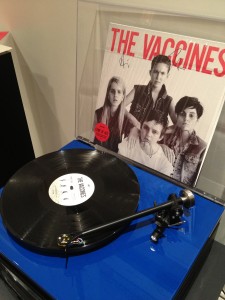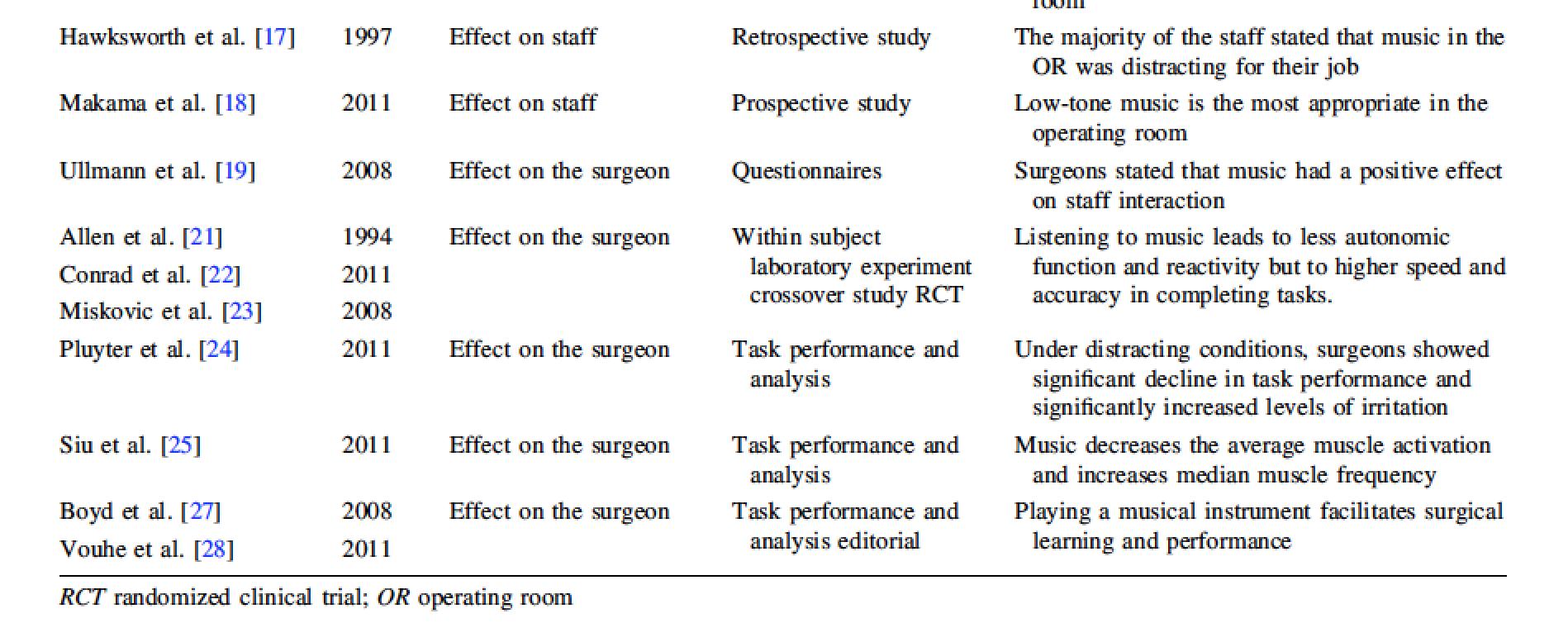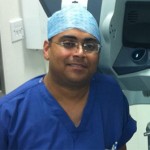No Classical Music In My Operating Room Please
For as long as I have been operating independently, music has been an essential part of my operating theatre environment. If there is no music playing in the background, it is to me as if there is a missing component of the “time out” check list that is carried out by surgical teams prior to each procedure.
For many years, I was trapped in the 70s and 80s with my choice of music. Bowie, Stones, R.E.M. and Pink Floyd were some of the artists that were on high rotation. It provided education to the growing numbers of nurses and medical students who had never heard of classic albums such as Dark Side of the Moon. These days I am lucky to find a medical student who can volunteer the names of the four Beatles – I don’t even bother asking if they know anything about Pete Best who was ousted in favour of Ringo. Sometimes they almost believe my suggestion that the next Pope will be named John Paul George Ringo I, which of course is a perfectly reasonable suggestion. The music played in my theatre therefore actually has an important educative role that makes up for parenting deficiencies with the failure to teach their children about classic rock acts of the 70s and 80s.
Over the past couple of years, I have been encouraged to explore contemporary music, which has led to a change in the music played in my operating theatre to performers such as the XX, The Vaccines, First Aid Kit, The Hives, Regina Spektor, Mumford & Sons and Laura Marling just to name a few. This has been a positive move in that I not only have come to appreciate some of the great new music that will one day become classic material, but it also receives a high approval rating from other staff within the operating room. I do admit that I have the latest David Bowie album on order in the vinyl format though an EBay seller.
Why am I telling you all about this? This month, a systematic review by authors Moris and Linos was published in the journal Surgical Endoscopy entitled Music meets surgery: two sides to the art of “healing”. Using fairly limited search terms, a literature search identified 28 relevant articles that were included for review. These papers covered a mix of subject matter including effects of music in the operating theatres on patients, surgeons and theatre staff.
As a surgeon, I will leave discussion of effects of music on patients to our anaesthetic colleagues and it is for them to debate whether there is any beneficial effect of music on induction and upon waking up. Our interaction with music occurs when the patient is asleep so our interest as surgeons lies primarily with its effects on ourselves and other members of staff in the operating room.
Having your anaethetist ‘on board’ with your attitude to music is essential. In the private sector, this is unlikely to be an issue given that you will generally choose to work with somebody who has some compatibility with your own personal tastes. The public sector can at times be challenging where the anaesthetist feels equally entitled and at times more entitled to determine the choice of music or even absence of music in the operating room– this requires tactful negotiation. The principle reason I tend to back off from a fight over this type of issue is that I hate going into an operation feeling cranky. The only time I may make a stand is when classical music is being played – the swings between the calms and storms of some pieces are a little too stressful for my liking.
So what do operating room staff prefer to listen to? Only a couple studies examined this but the bottom line is that classical music is not a clear majority choice – in one study it was favoured amongst 1.2% of respondents and in another it was 45%, they prefer to listen to a type of music that’s a bit more fun . With the latter, my personal inclination is that they were asking non-urologists who are no way as cool as urologists in general. My thoughts, as you may have gathered, are to drop the ‘al’ and choose classic music over classical music.
Summary of relevant studies extracted from Table 1 of the Moris study published in Surgical Endoscopy.
I am not sure I entirely agree with one conclusion of the review, which states: “With regard to its effect on surgical staff, music is thought to be distracting, reducing the staff’s ability to cooperate and coordinate”. Only one retrospective study is insufficient to reach the general conclusion about the effects of music on staff in operating theatres. My admittedly biased perspective has been in total agreement with the second conclusion that states “From a surgeon’s point of view, music facilitates achievement of higher speed and accuracy of task performance.”
Henry Woo is an Associate Professor of Surgery at the Sydney Adventist Hospital Clinical School of the University of Sydney in Australia. He has been appointed as the inaugural BJUI CME Editor. He is currently the coordinator of the International Urology Journal Club on Twitter. Follow him on Twitter @DrHWoo
Comments on this blog are now closed.







Great topic. Personally I like many types of music but for major cases it has to be quiet and relaxing. I have many patients under spinal so I usually give them the choice and hope I have something for them in my collection.
Check this out for 3 different perspectives on music in the operating theatre: https://www.bbc.co.uk/news/11632114
I did have rather an embarrassing moment recently with an awake patient when a 1980s album on shuffle suddenly started playing the ‘Jim’lll fix it’ theme tune … for those readers not from the UK, googling Jimmy Savile will quickly tell you why that was rather awkward! The patient did comment …
Yes, it could possibly be as embarrassing as playing Tie Me Kangaroo Down…..
Great piece Henry
Matt has already linked to the segment I did in the BBC a couple of years ago.
I think music is really important in theatre.
I always have something going in pt is under spinal.
For the robotic partials i have copied Sam Bhayani and have 6 x minute music tracks to time the on clamp time. Enables me to know the time without having to look up or have someone calling times out which I hate.
The theatre staff are getting bored of the same 6 tracks every week though!
Ben
Thanks Ben
You forgot about the piece in the Guardian
What brilliant use of music in the OR!
Urologists leading the way as usual!
Henry,
As one of your private sector anaesthetists perhaps I am taking an unnecessary risk by telling you that in my opinion Regina Spektor should be classified as noise rather than music.
The day (and by the grace of Apollo [the Greek God of Music for all you youngsters who never studied Classics] may that day never come) you discover Hip Hop is the day I think I will retire.
Dr Chris Ryan
In the spirit of cooperation, which is a natural urological trait, Regina Spektor (which is not everybody’s taste I confess) will be moved to lower rotation status on the playlist. This is also in recognition of your patience with the brief periods of high rotation with Fatboy Slim and Modest Mouse. The Strokes and Vampire Weekend will move in.
Interesting topic Henry! As a registrar I worked with a consultant who played Roy Orbison’s greatest hits in every theatre session. The number of times he shouted out “not yet Roy!” because the song’s crescendo was not quite in time with the operation was slightly distracting. Operations were halted so that the CD (remember those) could be skipped to the appropriate track. I have attempted a few of my own playlists in theatre with not good outcomes. Obviously I choose music I like. But that music makes me want to dance around my handbag not operate. I have tried more subdued music, David Gray, Ed Sheeran, James Blunt etc but I need a counselling session at the end of my list. So now I just talk to my anaesthetist about what I did at the weekend & where I’m going on holiday. No handbag required.
Great piece Dr. Woo.
As a surgical registrar and a semi-professional musician (classically trained!) I have always been observant of music choice in the operating theatre. I must say I am not a fan of some of your favourite artists.. I agree wholeheartedly that the ‘al’ be dropped from all things classic. I am going to stick my neck out and categorically state that you cannot go past 70s, 80s and 90s RnB to get the juices flowing. Surely you must remember Anita Baker, Bobby Caldwell, Horace Brown, Johnny Gill, Luther Vandross, Marvin Gaye…the list goes on and on.
The most bizarre music I’ve had the pleasure of assisting to was Finnish electro-trance for a neurosurgical list. The surgeon said it calmed him down.
Like medicine, the beauty about music is that there is a genre to suit every taste. So in the same way that I am thankful for classic RnB artists amongst the rock n roll and indie, I am thankful for urology amongst the general medicine and psychiatry!
Dear Henry,
Great Blog!
There is a Great Quote I always tell my juniors “If you are thinking about a topic to research, some is doing it or already done it!”. This is exactly what has transpired with your blog. I had in fact prepared a blog entitled “Urologists Rock” but you beat me to it! However, no research should go waste. Here is my piece of music.
Having previously failed to get a video submission at EAU and AUA, I wondered what was different about our videos when compared to others. Our techniques are good, video capture from the daVinci® was of superior quality, editing was at par with the winning abstracts. So what was missing? When attending these meetings, I concentrated on those accepted videos and realized what was very obviously different. The background music being played during the operation! Urologists love music and the judges are definitely influenced by the pace of the music matching the surgeon’s speed!
Music has been used as therapy for many centuries. Indeed Wiki defines Music Therapy (https://en.wikipedia.org/wiki/Music_therapy) as an ‘allied health profession and one of the expressive therapies, consisting of an interpersonal process in which a trained music therapist uses music and all of its facets—physical, emotional, mental, social, aesthetic, and spiritual—to help clients to improve or maintain their health!’ Indeed, there is an organization by the name of British Association of Music Therapy. Surprisingly, MT has been employed in managing urological patients. MT has been shown to substantially decrease anxiety and pain during Shock Wave Lithotripsy. Music-induced attention shift during prostate biopsy (https://www.ncbi.nlm.nih.gov/pubmed/22202544) may have a beneficial impact on procedural anxiety and pain perception. MT has been shown useful during flexible cystoscopy (https://online.liebertpub.com/doi/abs/10.1089/end.2012.0222) in a RCT (Level 1 evidence!). MT has shown to decrease pre-operative anxiety in patients about to undergo TURP. There is also evidence that pleasant music indeed calms neonates undergoing circumcision.
However, more interesting are the Urologists and their love for music. A survey showed 90% of surgeons in the UK listen to music on their theatre’s sound system during operations, with half of respondents favouring up-tempo rock, 17% pop music and 11% classical. Plastic surgeons play the most music and ENT surgeons, the least. Urologists were no doubt close to the top. Most Urologists have their own favourite tracks playing on in the background and often get used to listening to the same tracks during particular operations. This is very much true for robotic surgeons who are all alone in the console and would want some “familiar company” in the form of music.
One of the popular tracks heard during ureteroscopic LASERing of multiple calculii is “Another one bites the dust” by Queen! Another favourite track during PCNL is supposed to be “We will rock you”, again by Queen! Keeping down the warm ischemia time during partial nephrectomy is crucial. A popular track is “It is the Final Countdown” by the group Europe. However, recently at ERUS 2012, I found out that Dr Sam Bhayani, a proponent of Robot-Assisted Partial Nephrectomy has a series of songs played back to back when it comes to clamping the renal artery (The Lock-Down time). According to him, subconsciously this guides him roughly how many minutes has elapsed and he does not have to really rely on the theatre staff. I gather that The “Bhayani tracks” has now made its way into Europe! Coming to Europe, those who have been fortunate to befriend Dr Jens Rassweiler would know that he is part of a rock band known as “Uroblues” (The Mannheim Uroband) (https://www.ncbi.nlm.nih.gov/pubmed/8411961) and they have several tracks that can be accessed through Youtube. Their most famous one and fun to watch is “Oh Prostata” (the song with English subtitles begins at 1:40). Those living around London may have come across a medical group called “Amateur Transplants” who have a song on Haematuria! The song on Vasectomy by an Aussie folk singer John Williamson is also worth listening too.
Although there are studies that have shown that music may be distracting, there is a study in the JAMA that surgeon-selected music was associated with reduced autonomic reactivity and improved performance of a stressful nonsurgical laboratory task in study participants! Therefore the advice for Urologists is Rock on!
Regards,
Amrith Rao
Amrith, I am absolutely humbled by your reply – sorry to steal your thunder! Urologists do indeed Rock!
Managing the theatre environment is becoming the norm with the widespread adoption of the WHO checklist. Part of this can be to solicit opinions on choice of tracks for the case. With a globalised workforce tastes differ but empowering all team members to voice their opinions pays dividends in patient safety. I am fortunate to operate next door to Ben Challacombe. I enjoy looking down the twin console of the robot as he calmly and adeptly performs a partial nephrectomy. He also has tracks chosen to be 5 minutes long so that he is aware of the clamp time without a town crier declaring the time q. 5 minute and raising stress levels within the team.
Personally I like fairly uptempo music to keep the case progressing but will mute it when at tricky moments. After midnight jazz has no place in the operating room as it slows activity. I try to give my trainees first choice in music (or the absence of it) so as to maximise the learning experience. I do hope they come away further up the musical learning curve at the end of a list.
Nice post Henry. I’ve used playlists for local anaesthetic procedures for awhile now, which is great for the patients, esp those younger guys having a vasectomy. When a prominent Melbourne urological twitterati came to town for his vasectomy, I really pushed the boat out;
Theme From Benny Hill TV Themes
Take Me Home, Country Roads Toots & The Maytals
The Clock Thom Yorke
The Oompa Loompa Song Theme
Pumping On Your Stereo Supergrass
Leather and Lace Stevie Nicks & Don Henley
William Shatner’s Dog Stephen Fretwell
Stop your Crying Spiritualized
Gin and Juice Snoop Dogg
…Baby One More Time Travis
Wonderwall Ryan Adams
…and Carrot Rope Pavement
NOFX – Together on the Sand Nofx
Down By The River Neil Young & Crazy Horse
Trans Europa Express Kraftwerk
Goddies Theme The Goodies
Crazy Gnarls Barkley
Wichita Lineman Glen Campbell
Careless Whisper George Michael
The Ghetto/El Barrio George Benson
Cars Gary Numan
Build Me Up Buttercup The Foundations
The Most Beautiful Girl (In the Room) Flight of the Conchords
Fight Test Flaming Lips
Rock Me Amadaeus Falco
Hungry like the wolf Duran Duran
Derezzed Daft Punk
You can see that I tried to cover all his various music.
Now I just use Spotify, ask which artist, which album they want to listen to. They love it.
Great play list Liam. Gee it must have taken an incredibly long time to do that vasectomy but you have to make time for your colleagues.
Hi Dr Woo,
Again, a really interesting topic, thank you. As a physiotherapist I rarely get to venture ‘beyond the line’ into the OT. But I was mildly disconcerted when, going in for a small operation myself, I was greeted in the anaesthetic bay by R.E.M.’s ‘Everybody Hurts’. My gift to the surgeon afterwards – some new CDs for the OT (including Regina Spektor, I should add). And Amrith Rao – it was an ENT surgeon, too!
Kind regards,
Andrew Hirschhorn
Great post Henry,
Music is important to a lot of us. Being able to combine it with our other passion, surgery, makes all the sense in the world.
Nowadays a small iPod or iPhone can carry thousands of songs and categorize them into lists, genres and so on, so no need to carry a bag anymore. A subscription to spotify can also provide many hours of good music, and helps getting to know new groups by listening to other’s preferred music lists. (Henry might want to consider setting up a “music for surgical theatre list” to accompany this blog post ;-).
My personal experience though is that it is quite difficult to make everybody happy inside the operating room, if it is not the anesthetist, it is the nursing staff who disagrees with the particular choice of the day. Playing the radio is awful as you find yourself in a difficult moment in surgery listening to the last offers of the local supermarket chain.
So I did my research and found the earHero earphones, quite expensive, but these allow you to listen to music while being able to listen to all the sounds in the operative room. So if I am in the mood for some good flamenco music from Paco de Lucia, Pablo Alborán, Enrique Morente or so I can enjoy it with no interference from other theatre staff. Olé!!!
It’s clear all types of music induce mood and intellectual states, and whilst I am passionate about encouraging people to LISTEN to classical music – both old and new – because of it’s various intricacies, I agree that in a high pressure environment something a little more consistent is needed. Even a short piece by Mozart of Ellen Zwilich does not create the consistent, methodical pulse and mood of a 3 minute rock or pop song.
I’d much prefer my surgeon cut, scrape, connect, glue, staple and sew to a piece that focuses the mind, creates an environment in which they can concentrate consistently for extended periods of time and makes them feel comfortable.
Most people are not connected enough with “classical” music to appreciate how it can affect them positively and negatively, and it is difficult to know enough repertoire that encompasses a single, consistent mood – the stories classical music tell are just too jam packed!
Nice post Henry. The real Beatles trivia question of course is “who was Stu Sutcliffe?” Music is a central theme for me both in the OR and beyond. We spend so much of our time in surgery that the environment should be as pleasant as possible. The sanctuary of the OR is probably a very accurate term. Our clinics as you know tend to be far more stressful and occasionally a little chaotic. Would music help there? Probably but then i would not be able to take a good history!
My preference tends to lean towards classic rock in the OR. It anchors memories and makes me a happy person. I am very open however to the choice of music that anyone brings in. As long as ultimately something is playing it is good. We handle our tense moments in the OR better when happy. I also find when newbie trainees come into the OR that bringing in music trivia and quizzing them for the first hour only on music instead of medicine creates an instant bond and facilitates the other stuff. Hope to meet you and discuss soon at the AUA
Great comment Rajiv. On the matter of new trainees – they sometimes bring in new music for us to sample – if we keep an open mind, we sometimes end up liking it. I must confess that I did have one trainee who brought in a Dead Kennedy’s CD which didn’t quite hit the mark with other staff although secretly I loved that stuff (already had most of their albums on vinyl). So no more Dead Kennedys. Happy urologist and happy OR staff do help bring out the best for the patient IMHO.
Stephen Brown: I agree with your comments that classical music merits and i work to improve my own somewhat philistine nature. However don’t discount some of the very best elements of classic rock to also bring the same focus. To wit, “Shine on you Crazy Diamond”, Pink Floyd. Great discussion
Fabulous topic Henry & pertinent considering several recent conversations we have had regarding your music choices in theatre. I hate to say it but I think that I fall within that group that you are educating regarding classic rock acts…my parents choices, including The Seekers & Peter, Paul & Mary left great gaps and I know little of the works of R.E.M & Pink Floyd!
I agree with Ruth Collins that any upbeat music makes me want to boogie & is probably somewhat distracting from the task at hand, but classic contemporary music like The XX, a bit of a favorite, is perfect.
As a junior, however, I am for the time being at the mercy of the music preferences of my consultants. This has ranged from opera to jazz (quite a fan & appeals to a broad patient base) to Susan Boyle…an interesting mix!
Quite happy to continue with The Vaccines and the new Strokes album for the time being Henry!! Perhaps we could mix in some old school for the purposes of my education & to keep Chris on his toes!
Dear Henry,
I enjoy your blog. Indeed, The Mannheim Uroband exists since 1988 and we are still active on different levels (including youtube). However, concerning Music in the OR, the DaVinci-system has completely changed my attitude: You cannot have Music in the room, when you want to communicate from Console to Bedside!!
But at parties after Meetings or even personally in the evening, Music plays an important role for me and my friends.
Jens Rassweiler
Dear Jens,
When researching on this topic (please refer to my reply above), I came across the songs of Uroblues and indeed listened to many on Youtube. I really enjoyed the song “oh prostata” and most urologists would be seriously interested in an English version of the song!
Hope to see you’ll give a performance at one of the EAU’s in the near future!
Warm Regards,
Amrith Rao
Jens, you raise an excellent point. The robotic setup means ‘remote’ communication between the surgeon and the bedside team through microphones/speakers rather than our traditional approach of talking over the anaesthetised patient. Since starting robotics, the music plays in the background but the volume is probably sitting at less than 25% of what it previously has been – it is otherwise difficult to hear voice transmission clearly. Will robotics be the death of music in the OR?
For those that have nominated “The Sounds of Silence”, I offer you the surgical version:
The Sound of Suction (apologies to Paul Simon)
Hello sister my old friend
I’ve come to talk to you again
We hear the sound of the ECG
The rising pulse and the falling BP
And so we all, stay silent, we can tell
It’s not going well
There’s still the sound
Of suction
And as the surgeon starts to curse
And throws a scalpel at the nurse
Tilt the table, hold the legs up straight
Turn the drip up to its fastest rate
Better ring blood bank, and ask them for two more
No, make it four
There’s still the sound
Of suction
The crowd of people stood and prayed
For this was some hole that God had made,
He clipped and tied ’til the flow was stemmed
Then moved the pack and it started again
And the voice said “The total of the loss is written on the theatre wall
But that’s not all
There’s lots more in
The suction.”
And so the great man stood and swore
Ten thousand curses maybe more
Glasses steamed ’til they fogged his sight
Had them cleaned so he blamed the light
And while the blood, like silent red drops fell
Tried Surgicel
And sister changed
The suction
And when at last he got control
By stitching Dacron ‘cross the hole
He closed the wound round a big rubber drain
Then cleared off lest it started again
Registrar said “Sir, I really am impressed
You are the best”
And that’s the sound
Of Suction
B. Taylor
Late as usual! A very good friend of mine died recently of a brain tumour. He was one of the funniest people I will ever know. He wrote this song for us in 10 minutes whilst on a fishing holiday in Scotland. Tight lines, Peter!
The Urologists Song By I P Freely
Tune Men of Harlech
We’re the lads who do the plumbing
Keep your water cisterns running
Call us if you need unbunging
Plumbing engineers
If you’ve bent your ball cock
Caught yourself an airlock
Don’t despair – for we’ll be there
With crush and plunger we will get it unblocked
When your water pipe is leaking
And the kitchen tap is squeaking
We’re the lads who stop the leaking
Plumbing engineers
If your outflow is obstructed
Special tests will be conducted
Pipe stenosis reconstructed
Til it disappears
If you ever mention
Suffer from retention
Don’t say no- our fees are low
Just spend a penny to reduce the tension
Continents will sing our praises
When we have reduced the stasis
Follow us were going places
Plumbing engineers
Hi Henry.
Enjoyed reading your post.
I have often heard the saying that “Music is food for the Soul”. How true. Music can excite, relax, inspire & conjour up many emotions depending on the song & its relevance to one’s experiences in life. I feel I’m in a unique position to comment regarding music & surgery. As you know, I’m a qualified professional radio announcer in Perth, Western Australia & also a dental surgeon who operates both at my rooms & in hospital. For me, music certainly helps when I’m operating AND also acts as a means of “relaxing” my patients.
Music genre, of course, can influence the mood of both operator/patient. Personally, I like listening to contemporary music from the 1950s-1990s. My radio programme concentrates on rock-n-roll; contemporary & pop music from 50s-80s as a rule.
Does playing music distract me while operating? I would honestly say NO. I remember having an anaesthetist who wanted no music & it was a stressful list that day. The silence was DEAFENING! I’m not saying its for every surgeon & his operating team but I think the majority would agree, it does help.
Regarding distractions of surgical staff, I think discussions of ones after work activities is more of a distraction than background music. Volume is important. It should be of a level that is heard but not to affect conversation. During pre/post anaesthesia, music should be off or inaudible.
For some nervous patients, instructing them to bring an iPod of their favourite music often helps! I hope this adds a little spice to the discussion!
If any of your colleagues want to hear my programme, its on every Sunday afternoon 1-4pm (Perth time) on the net at http://www.curtinfm.com.au or Curtin DG or 100.1FM (Perth only).
And YES, I do play Dean Martin as well. Cheers Henry.
Dear Amrith
Dear Henry
These are the English Lyrics
The song is published on one of our CD (“Trust me I am a doctor”)
Supergland (Prostata)
Intro: Dm Dm
Dm Dm F C F C G G
Some day it will call on you
Urologists`favourite bugaboo
Sudden, sneaky, underhand
Enlargement of the prostate gland
Yesterday was hunky-dory
Now it`s all a different story
Some day it will call on you
Some day it will hit you too
In the darkness, there it lurks
Like a dam in the waterworks
Like a mountain stands supreme
Like an island in the stream
Am F Am F C C G G Am Am
Oh supergland, we always count on you
Oh supergland, you give us work to do
A pitstop for the human race
Our daily bread, our saving grace
We as pros, all know of course
The consequences and the source
When it`s time to turn the tide
We`ll be waiting at your side
Relieve you quickly from the pain
And let the urine flow again.
Oh supergland, we always count on you
Oh supergland, you give us work to do
A pitstop for the human race
Our daily bread, our saving grace
Solo1 (Guitar-Sax): Am F Am F G
Solo 2 (Jens): Am F Am F C C G G (vgl. Strophe)
You can even play it now
Jens
Big fan of the “Sound of Suction” in the OR. Never knew there was a Paul Simon version. This must be on the same LP as the “Smooth Obturator” by Sade.
Henry,
Very nice post. Enjoyed reading the many great comments it has subsequently inspired.
We were discussing music in the OR this morning when one of our techs shared this link after our case.
It’s about how the technology we use to enjoy music has changed over time.
https://theinterrobang.com/2013/04/four-decades-of-the-music-industry-one-gif/
I found the evolution of this technology, as depicted by the pie charts, to be very interesting.
Hope that this link can add further value to the conversation.
Best,
Brian
Dear Henry,
Thank you very much for teaching me not only the urology practices, but also the classic pops!! I will definitely remember the Vaccine!!!
It’s also great to see your collection of records and players (sorry for my poor English…guess there should be a better English terms, but I mean it!! They are really interesting, lovely!
Unfortunately they are difficult to be found in Hong Kong, I probably will go on with the 1990s HK pops, which in fact got quite good lyrics!
Marco Chan
from HK, Now in SAN!!
As a professional classical musician I wonder if I would have any say about what is played while someone is cutting into me. Would I be able to hear the music? Might it cause stress if I hated it? Some music gets me incredibly uptight and even angry. Of course first and foremost is the comfort and happiness of someone taking a knife to me, but still ….
I am fortune enough to be part of the Monday night Woo Crew. I believe our nights and team are the envy of many others because we not only have great music going, but because we are a team. Music is our love and we have a good time exploring new music and discussing the classics. It’s true about the Beatles question! Henry’s tastes have expanded so much and he is now the one introducing music to us. And as a classical musician Henry allows me the moment to indulge.
In short, we rock, our theatre rocks and Henry is our maestro!
Angela
So Henry. The results of the BJUI poll show most people agree with you! … no classical music. Or at least not the preferred choice. The most popular, perhaps not surprisingly, was contemporary music with 35% of votes with 21% preferring classic rock or pop 70/80’s style. Only 4% agreed with our editor and listened to jazz.
Of the readers who voted, only 12% don’t have music in the operating theatre. 53% say that the surgeon chooses the music while 28% take turns to choose the music.Only 5% of the time do the nurses choose the music which seems rather low but maybe not unexpected.
Finally, I see this is the most popular blog so far with 31 comments before this … that is going to take some beating!
Thanks Matt for the feedback about the poll – interesting results indeed. It was definitely a fun topic and one for which most surgeons have an opinion! I won’t be surprised if comments continue to trickle in over time.
And the comments keep coming.
Enjoyed Eric “blues man” Clapton at the Albert Hall last night with a friend. His 12 year old daughter slept through the riffs. It is a generation thing. I am rapidly improving my knowledge of contemporary music but can’t somehow make myself go to the BBC Proms.
Beware playing the wrong classical music on the patient coming out of anaesthesia – there was an anecdote that one of Sir Roy Calne’s liver transplants at Addenbrooke’s thought they had died at one point during the procedure. They were aware of an ethereal choir and bright lights. The Prof. was heard to recount that he wouldn’t play Verdi’s Requiem any more in theatre.
Does the same apply to ‘modern’ musical styles?